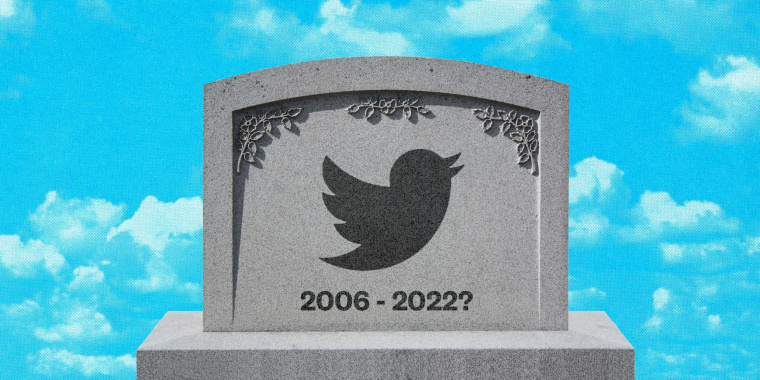If you haven’t already, you’re bound to see mournful social media posts in the coming days and weeks over what some tech experts are predicting is the downfall of Twitter.
The social media platform was beleaguered before Tesla CEO Elon Musk bought it last month. But the billionaire social media troll — who has a tendency to effectively light money on fire — has thrown gasoline on a flame that’s been burning for years now.
Musk has fired waves of employees, and hundreds more have reportedly quit as of Thursday. That includes many employees responsible for overseeing critical systems related to security, along with systems that allow Twitter to function generally, according to The New York Times.
So, what's the vibe like on Twitter?
The Verge's Richard Lawler described it well in a post Thursday:
"Some people are planning their moves to Instagram. Mastodon, MySpace, or names even older than that, but most of the active posts clearly fall somewhere along the five stages of grief."

No one should be surprised that a self-obsessed rich heir who runs an (exploding) car company apparently teeming with racism is a disastrous businessman. I think that’s part of what pains people about the potential loss of Twitter: It’s coming at the hands of an irritant who’s taunting them as he destroys something they associate with fond memories.
But I can’t help but think some of this pain (barring the pain felt by those who have lost their jobs since Musk took control of Twitter) is unnecessary. Now is not the time to fret over the loss of this platform many of us came to know and hate before Musk took it over.
Now is the time to seek out and establish new platforms and, importantly, new methods of conversation.
I’m not convinced the popular form of social media — a payment-free, open platform powered by paid, targeted ads — has been a net gain for democracy.
It’s clearly opened the door for users to be manipulated.
Twitter is commonly referred to as a “town square,” suggesting it has a democratizing impact on society. Personally, I envision this town square as nothing more than an open courtyard where people scream loudly. A cacophonous hellscape.
And this town square has been woefully susceptible to misinformation and disinformation.
Even the people who may have used Twitter to advance social causes — say, fighting misogyny in the gaming industry, or racist policing, or sexual predation, or totalitarianism across the globe — must admit counterrevolutionary extremist movements have used the same platform to recruit and inspire followers. Perhaps, to even greater effect.
So I ask those bemoaning Twitter’s decline: Is this the best we as a society can do? Cling to a hate-mongering machine because it’s allowed for occasional blips of enlightenment or excitement?
Maybe it’s time to embrace the shift from this model of “open” dialogue to more intimate discussion. In fact, I’d argue the shift is already happening.
Here, I’m thinking about Snapchat stories — and Instagram’s successful copycat — that still allow content makers to share information with their followers, but don’t presently allow users to see comments from other users (or bots) who may influence them. It’s an inventive social media compromise: spreading info to the masses while guarding against the herd mentality that drives a lot of conspiracy theories and online abuse.
I actually think Clubhouse, the once-popular audio-based platform that allows users to hold convos in private “rooms,” is another app that has capitalized on users’ want for more intimate, curated discussion rather than an “open square.” And Twitter’s “spaces” feature, which is effectively a copycat of Clubhouse, shows the company’s higher-ups (at one time) sensed there was a mass movement to more intimate social media exchanges, as well.
Twitter’s downfall has always seemed inevitable to me. And the fact people are reminiscing over it doesn’t prove its value — it proves Twitter employees did a good job marketing it as a necessity.
But Twitter isn’t a necessity. It’s an option. And although the platform may be dying, the internet is very much alive. As is the information on it.
We just need to find new and better ways to share it with one another.
